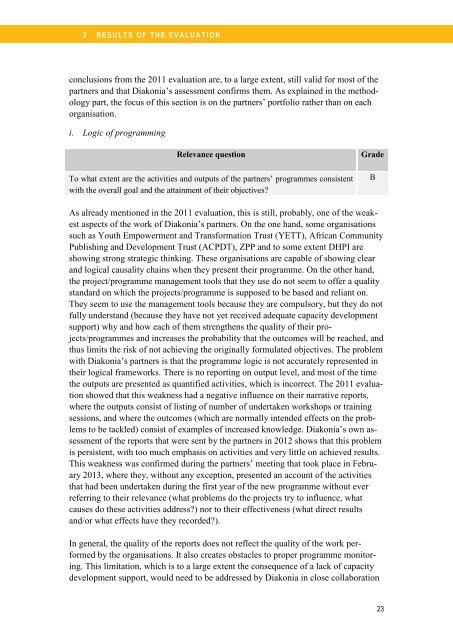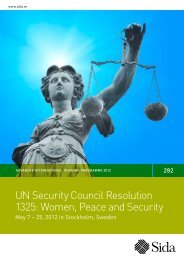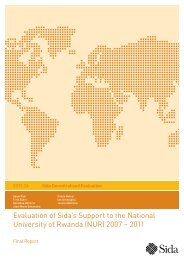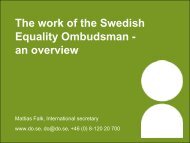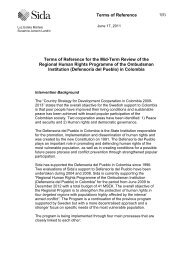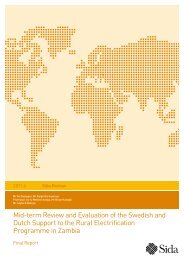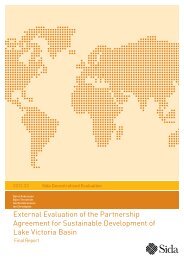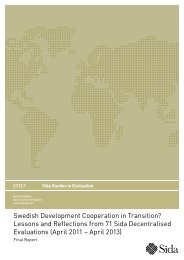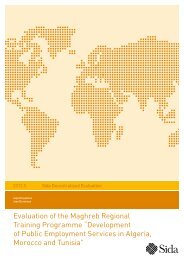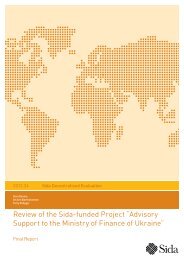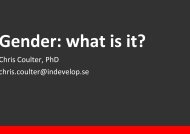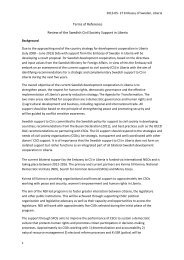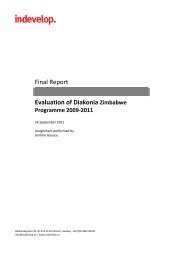Mid-term Review of the Diakonia Strategic Peace Building ... - Sida
Mid-term Review of the Diakonia Strategic Peace Building ... - Sida
Mid-term Review of the Diakonia Strategic Peace Building ... - Sida
You also want an ePaper? Increase the reach of your titles
YUMPU automatically turns print PDFs into web optimized ePapers that Google loves.
3 R E S U L T S O F T H E E V A L U A T I O N<br />
conclusions from <strong>the</strong> 2011 evaluation are, to a large extent, still valid for most <strong>of</strong> <strong>the</strong><br />
partners and that <strong>Diakonia</strong>’s assessment confirms <strong>the</strong>m. As explained in <strong>the</strong> methodology<br />
part, <strong>the</strong> focus <strong>of</strong> this section is on <strong>the</strong> partners’ portfolio ra<strong>the</strong>r than on each<br />
organisation.<br />
i. Logic <strong>of</strong> programming<br />
Relevance question<br />
To what extent are <strong>the</strong> activities and outputs <strong>of</strong> <strong>the</strong> partners’ programmes consistent<br />
with <strong>the</strong> overall goal and <strong>the</strong> attainment <strong>of</strong> <strong>the</strong>ir objectives?<br />
Grade<br />
B<br />
As already mentioned in <strong>the</strong> 2011 evaluation, this is still, probably, one <strong>of</strong> <strong>the</strong> weakest<br />
aspects <strong>of</strong> <strong>the</strong> work <strong>of</strong> <strong>Diakonia</strong>’s partners. On <strong>the</strong> one hand, some organisations<br />
such as Youth Empowerment and Transformation Trust (YETT), African Community<br />
Publishing and Development Trust (ACPDT), ZPP and to some extent DHPI are<br />
showing strong strategic thinking. These organisations are capable <strong>of</strong> showing clear<br />
and logical causality chains when <strong>the</strong>y present <strong>the</strong>ir programme. On <strong>the</strong> o<strong>the</strong>r hand,<br />
<strong>the</strong> project/programme management tools that <strong>the</strong>y use do not seem to <strong>of</strong>fer a quality<br />
standard on which <strong>the</strong> projects/programme is supposed to be based and reliant on.<br />
They seem to use <strong>the</strong> management tools because <strong>the</strong>y are compulsory, but <strong>the</strong>y do not<br />
fully understand (because <strong>the</strong>y have not yet received adequate capacity development<br />
support) why and how each <strong>of</strong> <strong>the</strong>m streng<strong>the</strong>ns <strong>the</strong> quality <strong>of</strong> <strong>the</strong>ir projects/programmes<br />
and increases <strong>the</strong> probability that <strong>the</strong> outcomes will be reached, and<br />
thus limits <strong>the</strong> risk <strong>of</strong> not achieving <strong>the</strong> originally formulated objectives. The problem<br />
with <strong>Diakonia</strong>’s partners is that <strong>the</strong> programme logic is not accurately represented in<br />
<strong>the</strong>ir logical frameworks. There is no reporting on output level, and most <strong>of</strong> <strong>the</strong> time<br />
<strong>the</strong> outputs are presented as quantified activities, which is incorrect. The 2011 evaluation<br />
showed that this weakness had a negative influence on <strong>the</strong>ir narrative reports,<br />
where <strong>the</strong> outputs consist <strong>of</strong> listing <strong>of</strong> number <strong>of</strong> undertaken workshops or training<br />
sessions, and where <strong>the</strong> outcomes (which are normally intended effects on <strong>the</strong> problems<br />
to be tackled) consist <strong>of</strong> examples <strong>of</strong> increased knowledge. <strong>Diakonia</strong>’s own assessment<br />
<strong>of</strong> <strong>the</strong> reports that were sent by <strong>the</strong> partners in 2012 shows that this problem<br />
is persistent, with too much emphasis on activities and very little on achieved results.<br />
This weakness was confirmed during <strong>the</strong> partners’ meeting that took place in February<br />
2013, where <strong>the</strong>y, without any exception, presented an account <strong>of</strong> <strong>the</strong> activities<br />
that had been undertaken during <strong>the</strong> first year <strong>of</strong> <strong>the</strong> new programme without ever<br />
referring to <strong>the</strong>ir relevance (what problems do <strong>the</strong> projects try to influence, what<br />
causes do <strong>the</strong>se activities address?) nor to <strong>the</strong>ir effectiveness (what direct results<br />
and/or what effects have <strong>the</strong>y recorded?).<br />
In general, <strong>the</strong> quality <strong>of</strong> <strong>the</strong> reports does not reflect <strong>the</strong> quality <strong>of</strong> <strong>the</strong> work performed<br />
by <strong>the</strong> organisations. It also creates obstacles to proper programme monitoring.<br />
This limitation, which is to a large extent <strong>the</strong> consequence <strong>of</strong> a lack <strong>of</strong> capacity<br />
development support, would need to be addressed by <strong>Diakonia</strong> in close collaboration<br />
23


